#the story of the youth who went forth to learn what fear was
Photo
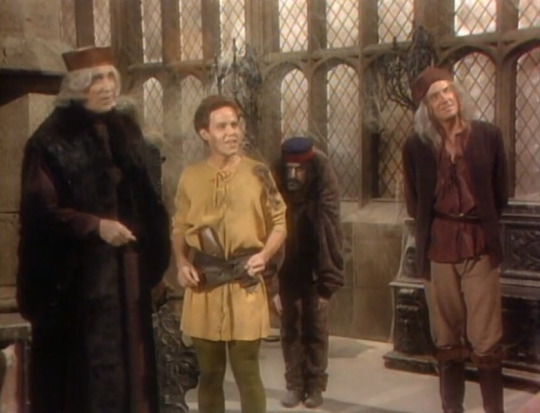
Christopher Lee as king Vladimir V, Peter MacNicol as Martin, Frank Zappa as Attilla and David Warner as the innkeeper in Shelley Duvall’s Faerie Tale Theatre: The Boy Who Left Home to Find Out About the Shivers (1984).
#faerie tale theatre#shelley duvall's faerie tale theatre#the story of a boy who went forth to learn fear#the boy who left home to find out about the shivers#fearnot#fearless#the story of the youth who went forth to learn what fear was
11 notes
·
View notes
Text
youtube
Interesting
#The Boy Who Found Fear at Last#The Story of the Youth Who Went Forth to Learn What Fear Was#The Boy Who Left Home to Find Out About the Shovers#Overly Sarcastic Productions#Youtube
3 notes
·
View notes
Text
Character ask: The Youth Who Went Forth to Learn What Fear Is
Tagged by @ariel-seagull-wings
Favorite thing about them: The sheer comedy of his nonchalant responses to terrifying things. Not only is he never afraid, he doesn't even treat the ghosts, goblins, and horrors he faces as anything out of the ordinary. That's the key to the story's humor.
Least favorite thing about them: The fact that he has seemingly no interest in working to help support his family unless it will teach him how to shudder. Of course laziness is a typical trait of rags-to-riches peasant heroes in fairy tales, but I'm glad the adaptations tend to downplay it and just make him quirky instead.
Also, while the ending is funny, with the princess finally making him shudder by drenching him in cold water filled with wriggling minnows, it's slightly disappointing that he never does learn to feel fear. It's no wonder that adaptations tend to change the ending so that something finally does scare him: whether touchingly (e.g. in The Storyteller's episode "Fearnot," when he finds his sweetheart dying of grief from his absence) or humorously (e.g. in Faerie Tale Theatre's "The Boy Who Left Home to Find Out About the Shivers," with his nervousness about getting married).
Three things I have in common with them:
*I tend to feel different from other people. (autism)
*I sometimes don't understand things that most people understand perfectly well. (again, autism)
*Sometimes my different way of thinking causes problems, but at other times it's actually helpful.
Three things I don't have in common with them:
*I'm far from fearless.
*My parents have never kicked me out.
*I'm female.
Favorite line:
When he sees the half-man fall down the chimney:
"Hey, you need another half still; one is not enough."
From the 1947 Let's Pretend radio adaptation, after the princess "teaches him how to shiver" with a bucket of ice water at the end:
"W-w-well, f-f-f-for Pete’s sake, t-t-t-teach me how to stop!"
From the Faerie Tale Theatre adaptation, in response to a zombie trying to scare him:
"One other thing. About your howl? I think you're using your voice wrong. You want to build from here. (points to his stomach) Right? You want to build from here. (pokes the zombie in the stomach - his hand squishes right through his skin) Sorry... Listen to me. From here. AAAAAAHHHHHHH!!! You try it.
brOTP: None in the Grimms' tale. But in the loose adaptation from Jim Henson's The Storyteller, "Fearnot," there's Mr. McKay, the cunning tinker who leads him to the scary places, initially just for money, but who eventually becomes his true friend.
OTP: The princess, or in Storyteller adaptation, his village sweetheart Lidia.
nOTP: Any of the monsters he meets.
Random headcanon: He's autistic. Now of course this is an anachronistic viewpoint; he's just meant to be a lucky fool, like so many other peasant boys in fairy tales. But the fact that he specifically can't relate to an emotion which comes naturally to everyone else, that he doesn't pick up on the emotional vibes that other people do in key situations, and that he has a hyperfixation (learning to shudder) and no interest in practical things that don't relate to that fixation... well, all those things sound familiar.
Viewing him from this perspective, I feel better about the fact that he never learns to feel fear: he'll always be different and that's okay.
Unpopular opinion: I don't think I have one, because his story isn't particularly well known. The best I can think of is that it deserves to be retold more often, especially around Halloween: its blend of spookiness and comedy is underrated.
Song I associate with them: None at the moment.
Favorite picture of them:
This illustration by Albert Weisgerber, showing him riding in the moving bed:

This illustration by H.J. Ford, showing the scene where the sexton tries to scare him disguised as a ghost:

This picture of the same scene by Maurice Sendak:
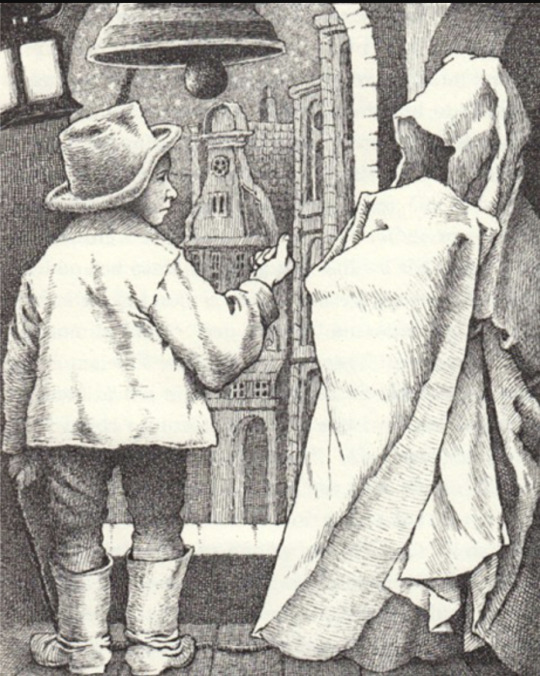
This illustration of the bowling scene (I don't know the artist):
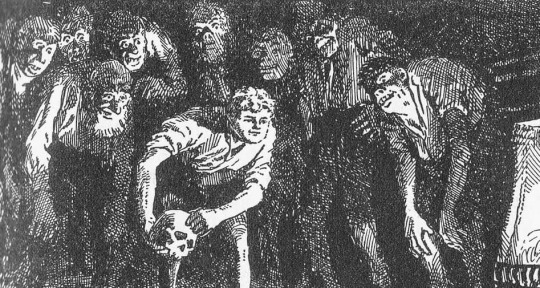
This illustration by Arthur Rackham:
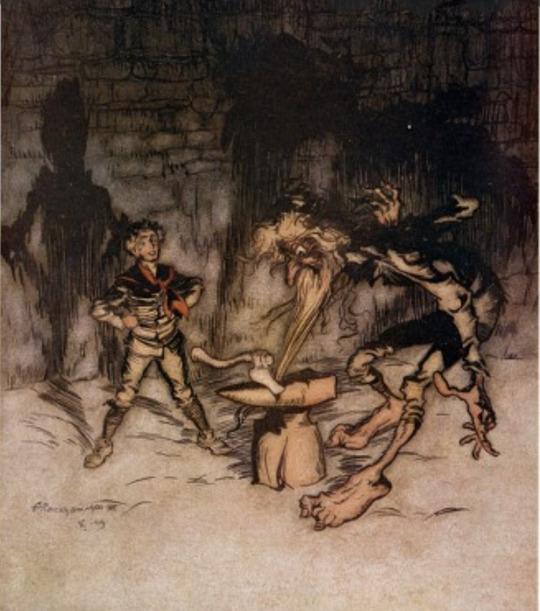
This illustration by Dagmar Hermann:
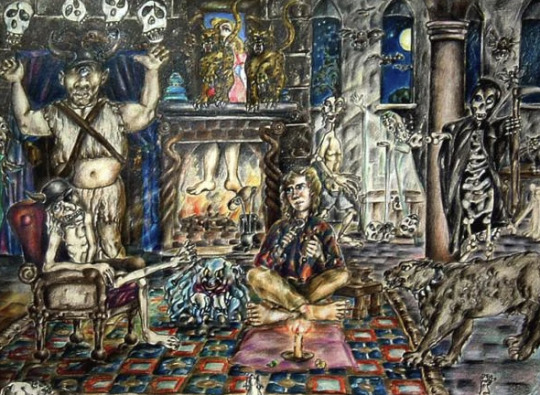
Peter MacNicol in the 1984 Faerie Tale Theatre adaptation, "The Boy Who Left Home to Find Out About the Shivers":

Reece Dinsdale in the 1987 adaptation from Jim Henson's The Storyteller, "Fearnot":
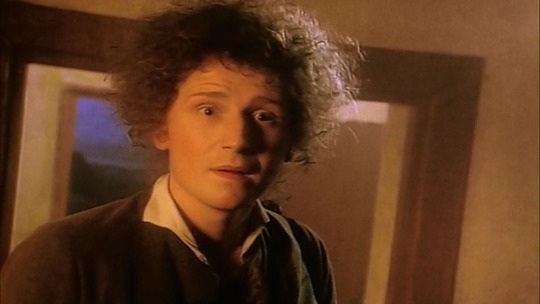
Tim Oliver Schultz in the 2014 adaptation from the German series Sechs auf einen Strech:
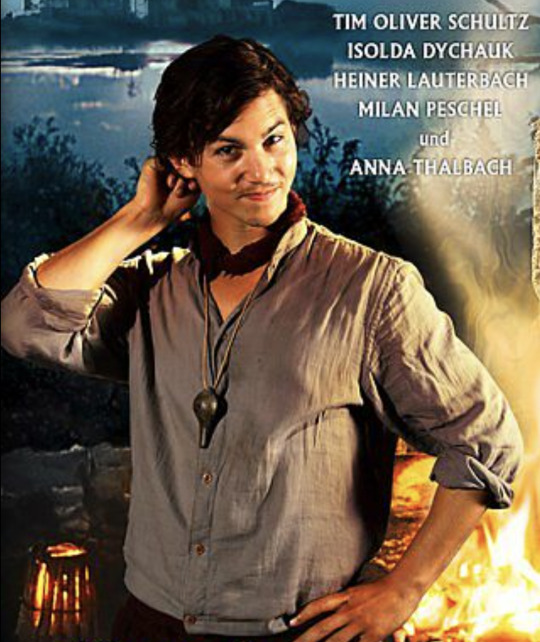
#character ask#ask game#the youth who went forth to learn what fear was#fairy tale#the brothers grimm#the story of the youth who went forth to learn what fear was#the youth who learned to shiver and shake#the boy who left home to find out about the shivers#fearnot
20 notes
·
View notes
Text
More paragraph breaks added by me because the originals go on for several pages if left alone.
almost 4k words long
@thenixkat I think you'd enjoy this one if you haven't read it yet
The Story of the Youth Who Went Forth to Learn What Fear Was
A certain father had two sons, the elder of who was smart and sensible, and could do everything, but the younger was stupid and could neither learn nor understand anything, and when people saw him they said: ‘There’s a fellow who will give his father some trouble!’
When anything had to be done, it was always the elder who was forced to do it; but if his father bade him fetch anything when it was late, or in the night-time, and the way led through the churchyard, or any other dismal place, he answered: ‘Oh, no father, I’ll not go there, it makes me shudder!’ for he was afraid. Or when stories were told by the fire at night which made the flesh creep, the listeners sometimes said: ‘Oh, it makes us shudder!’
The younger sat in a corner and listened with the rest of them, and could not imagine what they could mean. ‘They are always saying: “It makes me shudder, it makes me shudder!” It does not make me shudder,’ thought he. ‘That, too, must be an art of which I understand nothing!’
Now it came to pass that his father said to him one day: ‘Hearken to me, you fellow in the corner there, you are growing tall and strong, and you too must learn something by which you can earn your bread. Look how your brother works, but you do not even earn your salt.’
‘Well, father,’ he replied, ‘I am quite willing to learn something—indeed, if it could but be managed, I should like to learn how to shudder. I don’t understand that at all yet.’
The elder brother smiled when he heard that, and thought to himself: ‘Goodness, what a blockhead that brother of mine is! He will never be good for anything as long as he lives! He who wants to be a sickle must bend himself betimes.’
The father sighed, and answered him: ‘You shall soon learn what it is to shudder, but you will not earn your bread by that.’
Soon after this the sexton came to the house on a visit, and the father bewailed his trouble, and told him how his younger son was so backward in every respect that he knew nothing and learnt nothing. ‘Just think,’ said he, ‘when I asked him how he was going to earn his bread, he actually wanted to learn to shudder.’
‘If that be all,’ replied the sexton, ‘he can learn that with me. Send him to me, and I will soon polish him.’ The father was glad to do it, for he thought: ‘It will train the boy a little.’
The sexton therefore took him into his house, and he had to ring the church bell. After a day or two, the sexton awoke him at midnight, and bade him arise and go up into the church tower and ring the bell. ‘You shall soon learn what shuddering is,’ thought he, and secretly went there before him; and when the boy was at the top of the tower and turned round, and was just going to take hold of the bell rope, he saw a white figure standing on the stairs opposite the sounding hole. ‘Who is there?’ cried he, but the figure made no reply, and did not move or stir. ‘Give an answer,’ cried the boy, ‘or take yourself off, you have no business here at night.’
The sexton, however, remained standing motionless that the boy might think he was a ghost. The boy cried a second time: ‘What do you want here?—speak if you are an honest fellow, or I will throw you down the steps!’
The sexton thought: ‘He can’t mean to be as bad as his words,’ uttered no sound and stood as if he were made of stone. Then the boy called to him for the third time, and as that was also to no purpose, he ran against him and pushed the ghost down the stairs, so that it fell down the ten steps and remained lying there in a corner. Thereupon he rang the bell, went home, and without saying a word went to bed, and fell asleep.
The sexton’s wife waited a long time for her husband, but he did not come back. At length she became uneasy, and wakened the boy, and asked: ‘Do you know where my husband is? He climbed up the tower before you did.’
‘No, I don’t know,’ replied the boy, ‘but someone was standing by the sounding hole on the other side of the steps, and as he would neither give an answer nor go away, I took him for a scoundrel, and threw him downstairs. Just go there and you will see if it was he. I should be sorry if it were.’
The woman ran away and found her husband, who was lying moaning in the corner, and had broken his leg.
She carried him down, and then with loud screams she hastened to the boy’s father, ‘Your boy,’ cried she, ‘has been the cause of a great misfortune! He has thrown my husband down the steps so that he broke his leg. Take the good-for-nothing fellow out of our house.’
The father was terrified, and ran thither and scolded the boy. ‘What wicked tricks are these?’ said he. ‘The devil must have put them into your head.’
‘Father,’ he replied, ‘do listen to me. I am quite innocent. He was standing there by night like one intent on doing evil. I did not know who it was, and I entreated him three times either to speak or to go away.’
‘Ah,’ said the father, ‘I have nothing but unhappiness with you. Go out of my sight. I will see you no more.’
‘Yes, father, right willingly, wait only until it is day. Then will I go forth and learn how to shudder, and then I shall, at any rate, understand one art which will support me.’
‘Learn what you will,’ spoke the father, ‘it is all the same to me. Here are fifty talers for you. Take these and go into the wide world, and tell no one from whence you come, and who is your father, for I have reason to be ashamed of you.’
‘Yes, father, it shall be as you will. If you desire nothing more than that, I can easily keep it in mind.’
When the day dawned, therefore, the boy put his fifty talers into his pocket, and went forth on the great highway, and continually said to himself: ‘If I could but shudder! If I could but shudder!’
Then a man approached who heard this conversation which the youth was holding with himself, and when they had walked a little farther to where they could see the gallows, the man said to him: ‘Look, there is the tree where seven men have married the ropemaker’s daughter, and are now learning how to fly. Sit down beneath it, and wait till night comes, and you will soon learn how to shudder.’
‘If that is all that is wanted,’ answered the youth, ‘it is easily done; but if I learn how to shudder as fast as that, you shall have my fifty talers. Just come back to me early in the morning.’
Then the youth went to the gallows, sat down beneath it, and waited till evening came. And as he was cold, he lighted himself a fire, but at midnight the wind blew so sharply that in spite of his fire, he could not get warm. And as the wind knocked the hanged men against each other, and they moved backwards and forwards, he thought to himself: ‘If you shiver below by the fire, how those up above must freeze and suffer!’
And as he felt pity for them, he raised the ladder, and climbed up, unbound one of them after the other, and brought down all seven.
Then he stoked the fire, blew it, and set them all round it to warm themselves. But they sat there and did not stir, and the fire caught their clothes. So he said: ‘Take care, or I will hang you up again.’ The dead men, however, did not hear, but were quite silent, and let their rags go on burning. At this he grew angry, and said: ‘If you will not take care, I cannot help you, I will not be burnt with you,’ and he hung them up again each in his turn.
Then he sat down by his fire and fell asleep, and the next morning the man came to him and wanted to have the fifty talers, and said: ‘Well do you know how to shudder?’
‘No,’ answered he, ‘how should I know? Those fellows up there did not open their mouths, and were so stupid that they let the few old rags which they had on their bodies get burnt.’
Then the man saw that he would not get the fifty talers that day, and went away saying: ‘Such a youth has never come my way before.’
The youth likewise went his way, and once more began to mutter to himself: ‘Ah, if I could but shudder! Ah, if I could but shudder!’
A waggoner who was striding behind him heard this and asked: ‘Who are you?’
‘I don’t know,’ answered the youth.
Then the waggoner asked: ‘From whence do you come?’
‘I know not.’
‘Who is your father?’
‘That I may not tell you.’
‘What is it that you are always muttering between your teeth?’
‘Ah,’ replied the youth, ‘I do so wish I could shudder, but no one can teach me how.’
‘Enough of your foolish chatter,’ said the waggoner. ‘Come, go with me, I will see about a place for you.’
The youth went with the waggoner, and in the evening they arrived at an inn where they wished to pass the night. Then at the entrance of the parlour the youth again said quite loudly: ‘If I could but shudder! If I could but shudder!’
The host who heard this, laughed and said: ‘If that is your desire, there ought to be a good opportunity for you here.’
'Ah, be silent,’ said the hostess, ‘so many prying persons have already lost their lives, it would be a pity and a shame if such beautiful eyes as these should never see the daylight again.’
But the youth said: ‘However difficult it may be, I will learn it. For this purpose indeed have I journeyed forth.’ He let the host have no rest, until the latter told him, that not far from thence stood a haunted castle where anyone could very easily learn what shuddering was, if he would but watch in it for three nights.
The king had promised that he who would venture should have his daughter to wife, and she was the most beautiful maiden the sun shone on. Likewise in the castle lay great treasures, which were guarded by evil spirits, and these treasures would then be freed, and would make a poor man rich enough.
Already many men had gone into the castle, but as yet none had come out again.
Then the youth went next morning to the king, and said: ‘If it be allowed, I will willingly watch three nights in the haunted castle.’
The king looked at him, and as the youth pleased him, he said: ‘You may ask for three things to take into the castle with you, but they must be things without life.’
Then he answered: ‘Then I ask for a fire, a turning lathe, and a cutting-board with the knife.’
The king had these things carried into the castle for him during the day. When night was drawing near, the youth went up and made himself a bright fire in one of the rooms, placed the cutting-board and knife beside it, and seated himself by the turning-lathe. ‘Ah, if I could but shudder!’ said he, ‘but I shall not learn it here either.’
Towards midnight he was about to poke his fire, and as he was blowing it, something cried suddenly from one corner: ‘Au, miau! how cold we are!’
‘You fools!’ cried he, ‘what are you crying about? If you are cold, come and take a seat by the fire and warm yourselves.’ And when he had said that, two great black cats came with one tremendous leap and sat down on each side of him, and looked savagely at him with their fiery eyes.
After a short time, when they had warmed themselves, they said: ‘Comrade, shall we have a game of cards?’
‘Why not?’ he replied, ‘but just show me your paws.’ Then they stretched out their claws. ‘Oh,’ said he, ‘what long nails you have! Wait, I must first cut them for you.’
Thereupon he seized them by the throats, put them on the cutting-board and screwed their feet fast. ‘I have looked at your fingers,’ said he, ‘and my fancy for card-playing has gone,’ and he struck them dead and threw them out into the water.
But when he had made away with these two, and was about to sit down again by his fire, out from every hole and corner came black cats and black dogs with red-hot chains, and more and more of them came until he could no longer move, and they yelled horribly, and got on his fire, pulled it to pieces, and tried to put it out.
He watched them for a while quietly, but at last when they were going too far, he seized his cutting-knife, and cried: ‘Away with you, vermin,’ and began to cut them down.
Some of them ran away, the others he killed, and threw out into the fish-pond. When he came back he fanned the embers of his fire again and warmed himself. And as he thus sat, his eyes would keep open no longer, and he felt a desire to sleep. Then he looked round and saw a great bed in the corner. ‘That is the very thing for me,’ said he, and got into it.
When he was just going to shut his eyes, however, the bed began to move of its own accord, and went over the whole of the castle. ‘That’s right,’ said he, ‘but go faster.’ Then the bed rolled on as if six horses were harnessed to it, up and down, over thresholds and stairs, but suddenly hop, hop, it turned over upside down, and lay on him like a mountain.
But he threw quilts and pillows up in the air, got out and said: ‘Now anyone who likes, may drive,’ and lay down by his fire, and slept till it was day.
In the morning the king came, and when he saw him lying there on the ground, he thought the evil spirits had killed him and he was dead. Then said he: ‘After all it is a pity,—for so handsome a man.’
The youth heard it, got up, and said: ‘It has not come to that yet.’ Then the king was astonished, but very glad, and asked how he had fared.
‘Very well indeed,’ answered he; ‘one night is past, the two others will pass likewise.’
Then he went to the innkeeper, who opened his eyes very wide, and said: ‘I never expected to see you alive again! Have you learnt how to shudder yet?’
‘No,’ said he, ‘it is all in vain. If someone would but tell me!’
The second night he again went up into the old castle, sat down by the fire, and once more began his old song: ‘If I could but shudder!’
When midnight came, an uproar and noise of tumbling about was heard; at first it was low, but it grew louder and louder. Then it was quiet for a while, and at length with a loud scream, half a man came down the chimney and fell before him. ‘Hullo!’ cried he, ‘another half belongs to this. This is not enough!’ Then the uproar began again, there was a roaring and howling, and the other half fell down likewise. ‘Wait,’ said he, ‘I will just stoke up the fire a little for you.’
When he had done that and looked round again, the two pieces were joined together, and a hideous man was sitting in his place. ‘That is no part of our bargain,’ said the youth, ‘the bench is mine.’ The man wanted to push him away; the youth, however, would not allow that, but thrust him off with all his strength, and seated himself again in his own place.
Then still more men fell down, one after the other; they brought nine dead men’s legs and two skulls, and set them up and played at nine-pins with them.
The youth also wanted to play and said: ‘Listen you, can I join you?’
‘Yes, if you have any money.’
‘Money enough,’ replied he, ‘but your balls are not quite round.’ Then he took the skulls and put them in the lathe and turned them till they were round. ‘There, now they will roll better!’ said he.
‘Hurrah! now we’ll have fun!’
He played with them and lost some of his money, but when it struck twelve, everything vanished from his sight. He lay down and quietly fell asleep.
Next morning the king came to inquire after him. ‘How has it fared with you this time?’ asked he.
‘I have been playing at nine-pins,’ he answered, ‘and have lost a couple of farthings.’
‘Have you not shuddered then?’
‘What?’ said he, ‘I have had a wonderful time! If I did but know what it was to shudder!’
The third night he sat down again on his bench and said quite sadly: ‘If I could but shudder.’
When it grew late, six tall men came in and brought a coffin. Then he said: ‘Ha, ha, that is certainly my little cousin, who died only a few days ago,’ and he beckoned with his finger, and cried: ‘Come, little cousin, come.’ They placed the coffin on the ground, but he went to it and took the lid off, and a dead man lay therein.
He felt his face, but it was cold as ice. ‘Wait,’ said he, ‘I will warm you a little,’ and went to the fire and warmed his hand and laid it on the dead man’s face, but he remained cold. Then he took him out, and sat down by the fire and laid him on his breast and rubbed his arms that the blood might circulate again.
As this also did no good, he thought to himself: ‘When two people lie in bed together, they warm each other,’ and carried him to the bed, covered him over and lay down by him. After a short time the dead man became warm too, and began to move. Then said the youth, ‘See, little cousin, have I not warmed you?’
The dead man, however, got up and cried: ‘Now will I strangle you.’
‘What!’ said he, ‘is that the way you thank me? You shall at once go into your coffin again,’ and he took him up, threw him into it, and shut the lid. Then came the six men and carried him away again. ‘I cannot manage to shudder,’ said he. ‘I shall never learn it here as long as I live.’
Then a man entered who was taller than all others, and looked terrible. He was old, however, and had a long white beard.
‘You wretch,’ cried he, ‘you shall soon learn what it is to shudder, for you shall die.’
‘Not so fast,’ replied the youth. ‘If I am to die, I shall have to have a say in it.’
‘I will soon seize you,’ said the fiend.
‘Softly, softly, do not talk so big. I am as strong as you are, and perhaps even stronger.’
‘We shall see,’ said the old man. ‘If you are stronger, I will let you go—come, we will try.’
Then he led him by dark passages to a smith’s forge, took an axe, and with one blow struck an anvil into the ground.
‘I can do better than that,’ said the youth, and went to the other anvil. The old man placed himself near and wanted to look on, and his white beard hung down. Then the youth seized the axe, split the anvil with one blow, and in it caught the old man’s beard. ‘Now I have you,’ said the youth. ‘Now it is your turn to die.’
Then he seized an iron bar and beat the old man till he moaned and entreated him to stop, when he would give him great riches. The youth drew out the axe and let him go. The old man led him back into the castle, and in a cellar showed him three chests full of gold. ‘Of these,’ said he, ‘one part is for the poor, the other for the king, the third yours.’
In the meantime it struck twelve, and the spirit disappeared, so that the youth stood in darkness. ‘I shall still be able to find my way out,’ said he, and felt about, found the way into the room, and slept there by his fire.
Next morning the king came and said: ‘Now you must have learnt what shuddering is?’
‘No,’ he answered; ‘what can it be? My dead cousin was here, and a bearded man came and showed me a great deal of money down below, but no one told me what it was to shudder.’
‘Then,’ said the king, ‘you have saved the castle, and shall marry my daughter.’
‘That is all very well,’ said he, ‘but still I do not know what it is to shudder!’
Then the gold was brought up and the wedding celebrated; but howsoever much the young king loved his wife, and however happy he was, he still said always: ‘If I could but shudder—if I could but shudder.’ And this at last angered her.
Her waiting-maid said: ‘I will find a cure for him; he shall soon learn what it is to shudder.’ She went out to the stream which flowed through the garden, and had a whole bucketful of gudgeons brought to her.
At night when the young king was sleeping, his wife was to draw the clothes off him and empty the bucket full of cold water with the gudgeons in it over him, so that the little fishes would sprawl about him.
Then he woke up and cried: ‘Oh, what makes me shudder so?—what makes me shudder so, dear wife? Ah! now I know what it is to shudder!’
#Rjalker reads Grimms' Fairy Tales#Public domain#public domain stories#public domain characters#fairy tales
6 notes
·
View notes
Text
Stern is occasionally aware of how time has frozen over as he refers back to all these lectures. He writes, for example, that he regrets his failure, in the past, to write about National Socialism’s admirers abroad. But there was nothing to stop him making up for this omission in his memoir. The ‘marvellously austere’ James Conant, a former president of Harvard, one of Stern’s mentors for a brief time and high commissioner in Germany after the war, a man whose vigour and knowledge, Stern says, were matched only by Arthur Burns in the 1970s and Richard Holbrooke in the 1990s, might be a case in point. Conant sent delegations from Harvard to various functions at German universities and played host to Nazi officials at Harvard even after Kristallnacht and after German universities had been purged of Jewish academics. (This might have meant little to the president of an Ivy League university since these institutions at the time had few or no Jews on their faculties. The first Jew to get tenure at Yale was Paul Weiss in 1946.) In his role as a leading chemist, Conant advised Dupont not to hire the refugee scientist Max Bergmann because he was ‘definitely of the Jewish type’. Postwar German democracy was nursed along by men like Conant, who weren’t raging anti-semites but the polite sort, the sort who were perfectly happy to lend the prestige of America’s premier university to Nazi institutions. What exactly would Stern have us make of such things?
This brings up the larger question that looms over this book. It is written under the sign of Camus’s The Plague. One ‘should bear witness’, says the epigraph with which Stern begins; one needs ‘to state quite simply what we learn in time of pestilence’; to teach that ‘the plague bacillus never dies or disappears for good; that it can lie dormant for years … that it bides its time.’ The allegory is all too clear in the first part of the book, as it tells the story of what happens when the political rats are allowed to go forth and triumph. It may well be that Stern’s exemplary life of liberal civic involvement – he supported civil rights causes, opposed the Vietnam War, spoke out against Reagan’s going to Bitburg cemetery, and writes critically of his adopted country’s attack on Iraq and on individual liberties at home – is born of a passion to live out what he learned in a time of pestilence. Certainly, most of his serious historical work is engaged in some way with what went wrong in Germany. But the ideal of active citizenship is very familiar. And the threat of a renewed Nazism seems remote.
Too much of the second part of the book seems disingenuously marshalled under the banner of ‘never again’. Stern was a leader, he proudly reports, of the so-called ‘Stern gang’ – an odd allusion to the 1940s Zionist terrorist group – that opposed making concessions to Columbia students in 1968. Whatever the merits of the case, it is hard to believe that he really thinks, as he claims he did at the time, that the idealistic student radicals of 1960s Columbia shared much with the quite differently motivated Nazi students of 1930s Germany. Although he allies himself with other émigré academics, the fear of a reborn Hitler Youth in 1960s New York has to be more of a post hoc justification of views held for other political and personal reasons than a real motivating force: that his mentor Lionel Trilling nodded approvingly at every point Stern made at a crucial faculty meeting had to count for something. (No one has researched the question of how refugees from Nazi persecution reacted as a group to the student unrest of the Vietnam War era. At Berkeley, the two most important supporters of the Free Speech Movement at the Law School, Richard Buxbaum and Hans Linde, were Jewish refugees from Nazi persecution; the refugee scholar Leo Lowenthal, a leading member of the Frankfurt School, also sided with the FSM students. Others were on the side of the administration at various times or not engaged at all.)
5 notes
·
View notes
Text
Fairy Tale June : Lets Pretend The Youth Who Learned To Shiver and Shake
Dont worry still doing these,just took a break not to get burnt out.Todays we will look at a radio adaptation of the "The Story of the Youth Who Went Forth to Learn What Fear Was
Ummm I usually like to have a visual representing the thing Im rviewing but this is radio so umm...Enjoy this picture of this episodes star Arthur Anderson

In this 1947 radio episode Bud (Arthur Anderson) has never known fear and thus is going to a haunted castle not only to pass a test but really to learn what fear is
So my experience with old time radio is limited: My grandad used to have a few Shadow episodes on cassett butI was so young I didnt comprehend them,and I have listened partially to the Clan of the Firey Cross arc of Adventures of Superman .My biggest exposure to Golden Age radio is I am a fan of the Lux Radio Theater ,which adapted popular films into radio drama often with big stars .SO I have never heard of Lets Pretend,a show that adapted classic fairy tales for kids , till @princesssarisa started discussing episodes and actuallly is partially reponsible for this review by reccomending episodes for me to check out ,thanks @princesssarisa !
Now why didI pick this one ?Partially because its based on a lesser known fairy tale that I only know due to being adapted on both Shelley Duvalls Faeirie Tale Theater and Jim Hensons The Story Teller ,but mostly due to it starring radio veteren Arthur Anderson,who woulld later voice Lucky the Leprechaun for Lucky Charms and replace Lionel Wilson as the voice of Eustace Bagge in childhood favorite Courage The Cowardly Dog .Anderson was a regular in Lets Pretend ,but this was his only lead role in an episode
Now sadly I dont have much to say other then...I thought this was cute .It is very similar to Shelley Duvalls adaptation,and being a comical tale it was fun .I think Anderson did a good job ,though I was less then impressed by the spooky castle scene though this is the first version I have encountered that I am aware keeps the original ending .I definately wanna check out more
Overall had a good time
@ariel-seagull-wings @filmcityworld1 @the-blue-fairie @autistic-prince-cinderella @princesssarisa @themousefromfantasyland@amalthea9 @scarletblumburtonofeastlondon @theancientvaleofsoulmaking @angelixgutz
12 notes
·
View notes
Text
Dear Yuletide Writer 2023...
It’s this time of the Year again...
Dear secret Santa,
this year I wish for world peace more than ever! If for some reason you can’t deliver, I’d be delighted about a sweet little story, too! ;)
Things I really like to read (about):
Happy endings. Period. It may be old-fashioned, I don’t care. It’s christmas, after all. J Name dropping, historical events dropping (is this even a word that exists?). Slash, especially femslash. Historical accuracy – or, at least not blatant inaccurancy. People who are good at heart. People who are interesting/special (in whatever way). People who manage to be good at heart and interesting/special (in whatever way) at the same time. (Why do so often the baddies end up being the only interesting people)? The sea. The seasons. Wordplay and banter. Colours and clothing. Nature. Wittiness. Little moments. The weather. Characters that have deep respect for each other. Characters that are competent at things (but not to a nearly-impossible, „genius“ degree). Characters that are open-minded.
Things I don’t mind at all:
Religion in general and christianity in special. POV/ first person narrator. Consensual Sex (in whatever form). Rainbows.
Things I don’t like to read (about):
Sad endings. No, not even if they’re called „bittersweet“. Graphic violence. Injustice. Bashing of religion. Non-con. Characters dying. Slapstick. Parents who don’t love their children. Friendships or relationships that come apart.
Please. I mean it. Honestly. Even while mentioning all of the above, I had too many Yuletides getting stories about main characters dying (twice! because of time travel), mothers that despised her children, friends that took their farewells forever, characters seriously debating killing babies ... And no, however much some people would find this cool and edgy - I’m not one of them. I’m a hippie at heart! Please, please, love and peace and pancakes (in the end), even if only at Christmas. :)
---
Things I love about my fandoms - and some questions and plotbunnies to hopefully give you some ideas:
19 Century CE German writers:
Two years ago, while I was teaching about German Romanticism Writers I really became interested in them. They were such nerdy guys - all of them! And so much of their lives sound like they were taken from romantic novels themselves: dead parents, living at old castles or near a moor, being unhappily in love with each other, having dark secrets, dying of consumption ...
I absolutely like Annette von Droste-Hülshoff best! Because if you read about her in any literary history book (or even wikipedia), she seems like *the* most boring writer ever. Which couldn’t be further from the truth! Only that she very much valued her privacy... with burning letters, inventing tricks like little letters inside of letters, using ‘male’ speakers in her poems, self-censuring her writing to the point of being in danger of not getting across the message. Or, plaing demure Catholic noble lady, exploiting all the stereotypes - which, sadly, backfired into later generations taking them for truths.
So much about her is so worthy to be digged out: her being bilingual from childhood (since she was so small at birth, no one believed she would live, so she was given to a wet nurse who spoke French and called her Annette), her shortsightedness to the point of being legally blind (yet she wasn’t allowed to wear her glasses outside of the house because glasses are “ugly” and the sense of life, as we all know, for women is being pretty), her rap battle roast (well, isn’t “Stegreifreimen” more or less a kind of rap?) of the Brothers Grimm when she was only 15 (and, by the way, she may have been the one who told them Snow White and the Story of the Youth who went forth to learn what fear was), her being a badass natural scientist, trained singer and even composer (even if, to this day still, not a single note by her has ever been performed). Even if she suffered her whole life from bad migraines and other chronic illnesses (a food intolerance, maybe). Or that she was the only German writer who tried something like Catholic Enlightenment literature in her - which mostly got ignored like so many other texts by her. And speaking of “the only one” - besides Heinrich Heine (who, as a jew, had a very personal interest in it) she was the only Romantic writer who, in “Die Judenbuche” wrote against Anti-Semitism.
And of course, all the major queer vibes she gives with her many lady friends (Amalie Hassenpflug even got buried beside her and Adele Schopenhauer fumed with jealousy over a possible blooming relationship between Annette and Adele’s girlfriend, Sibylle Meertens-Schaaffhausen) and rededicated poems (”What do you mean, this poem is about my ‘lady’ friend?! I’m sorry...?! Of course, it is dedicated to my publisher! I really do not know what you’re insinuating here and I don’t think that thing is appropriate to discuss with a decent unmarried Catholic lady like myself.”). It seems crazy to think that even today, this is nearly never mentioned at all in articles or books about her. Because of cause, famous writers have to be gold standard hetero, each and every one, don’t they - and anyway, being queer was not yet invented? And surely, her not marrying was because her heart was broken after her family destroyed her relationship with her boyfriend in the “Jugendkatastrophe” - and of course she never tried her luck in love e v e r again after this. Sigh...
There is so much more I could mention... like, for example, her early (for lack of a better word) environmental awareness... yet, for now, lets free some plot bunnies, shall we?
I’d like to read about her childhood and youth. Some episodes that foreshadow things that will be important in her later life, maybe? Or what really happened in all of those holidays at the Haxthausen house in Bökendorf, with the Brothers Grimm whom she hated? What about her first ball where she got to know that ‘feminist’ writer Katharina Sibylla Schücking that she instantly was so fascinated with (the diary of Annette’s sister Jenny complains that Annette “nearly did not dance at all and only talked with that woman all night”)? Or write about her hiking in the moors, about how a normal day would have been for her. Or how some of her works came into existence. Or some censored (and uncensored) correspondance - (most of which, of cause, got destroyed by her family)?
I’d like for it to be at least a tiny little bit queer... would be such a waste if not! ;)
Das Fräulein von Rodenschild (Annette von Droste-Hülshoff)
Even if I have a lot to do with German literature professionally, I only came across this ballad relatively recently. And I love it!
It would lend itself nicely for a backup fandom, since it is only a ballad with not much (if any) context to it. You can read it here: https://www.droste-portal.lwl.org/de/werk/lyrik/ausgabe-1844/balladen/das-fraulein-von-rodenschild/
I have to say, however, that my headcanon derives from the self-censored earlier version in which she kisses the ghost. ;) Because I very much got the vibe the Fräulein von Rodenschild is a lesbian female ghost huntress in the Middle Ages (or, alternatively, in the Early Modern Era or the early 19th century). And I’d absolutely love for a story about such a woman!
Some ideas:
What is the emotional distress our hero is in in the first few lines? “Schwül” and “siedend(es) Blut” sounds very much like an unfulfilled desire, does it not? ;) What does the ghost want? Why is it there? Is it even a “real” ghost - or some psychological phenomenon? Does our heroine have experience in handling ghosts? Where from? What do the peasants think of her? How does she come to the idea to kiss the ghost? What happened to her hand? What is so very “toll”/”crazy” about her?
Feel absolutely free to merge the heroine of the poem with Annette von Droste-Hülshoff, who wrote it to impress Adele Schopenhauer - only to have her judge that “the FRäulein von Rodenschild” got punished to little!
The Sea-Wolf (Jack London)
Maybe my love of the sea may have been arisen partly from watching the German/French/Romanian mini TV series (1971) as a very young child.
If it so happens that you know it, too – I’d be delighted if you write in that canon, where both men know each other (or, at least, Van Weyden does) from their youth. I loved the soundtrack and the wonderful sailing ship and how Van Weyden fells in love with the sea, harsh and beautiful beyond compare, and becomes his true self even under cruel circumstances.
They both make for wonderful slash, don't you think? ;) But please no violence (opposed to story as a whole) or non-con. I don't care much how far they would go (write as much as you feel comfortable or what seems right for you) - instead more for the mutual, grundgingly admitted respect and appreciation that blooms into something more or finds ways to be expressed.
Maud is a very interesting addition to the equation – she makes them all a real triangle, because there is genuine interest and respect and a shared love for literature and not to forget a whole lot of UST between all of them. And Maud is such a great character! She doesn’t need to be the “strong” female to be strong in her own right. She is much more emancipated and feminist than a lot of “wonder women” out there.
So, I absolutely can picture some kind of threesome polyarmory – but it doesn’t have to be one, could also be like a POV from each of them. Or a couple that tentatively explores their interest in the third party? So many possibilities!
And while I’m absolutely aware that the book (and the mini series) goes very deep into philosophilcal and ethical questions about what friendship is or the nature vs. nurture debate and so on… I’d be absolutely happy with good old porn, too! :P
Prince Ahmed and the fairy Pari Banu (Arabian Nights)
This fairy-tale was something special to me when I was a child. I completely identified with the sorceress. How cool to be so competent that they send you as a spy to complete a dangerous mission? And what exciting and amazing mission to spy on a mighty fairy! Also, I didn’t quite understand the tingly feeling when I pictured myself as the sorceress amazed by all the glory of Pari Banu… until much, much later in life. 😉 Pari Banu, who is everything fairy(-tale)- like: has powers and riches seemingly without end, a brother who is a djinni, a kingdom (queendom?) made entirely out of women, that puts even princes in awe, a queen that seemingly can read minds and do magic, the ruler of animals and weather phenomena. Just… wow.
So please, give me a story about that sorceress and let’s just forget about her gruesome ending in the fairy-tale, will we? Surely that was some kind of mistake with the translation…
If you’re comfortable with it, make it Sorceress/Pari Banu, I would love to hear a story that somehow has them both together. I’m relatively sure that not only has the Sorceress any cause of being in awe with the Pari Banu, Pari Banu herself may also be quite delighted in a woman that is clever and cunning and not afraid of danger and may or may not know herself some kind of magic? There’s such a great backstory slumbering within… - don’t you think?
So, after all that rambling - I hope I could get you some ideas! May the muses be graceful! Have a happy Yuletide! :)
2 notes
·
View notes
Text
My thing with Shock Fiction is like "The Story of the Youth Who Went Forth to Learn What Fear Was"
Except for me it's like The Story of the Weirdo Asshole Who Went Forth To Learn What Disgust Was
And like I'd love to shudder with disgust and MHE sure made me shudder but it was with like Incandescent Rage and I still don't know what disgust feels like fully
4 notes
·
View notes
Text
Part Two: Ambitions, Politicians, Cuckolds, & Maidens.

Angela ana’José Cadaval arrived in Graza shortly before the death of Queen Isolde. Her husband the Duke of Corudiz had just been appointed to the great (and new) council and after fifteen years of marriage she made the journey to the sparkling court in support.
She would write many years later in her memoir that she found King Frederick, then just twenty-six years of age, to be “decently charming and smart enough to be impressive,” but also “woefully foolish”. In describing how her affair would start with the monarch ten years her junior and, as someone in her own words who “lacked many natural attributes of beauty”, Angela writes “the king, for any perceived faults was at least always aware of his own immaturity and foolishness. He sought after maturity and approval from any source and I think he, seeing the wealth of experience in my life, was glad to have my attention because it proved he could hold conversation with someone who was not his direct peer.”
Councillor Cadaval, according to Angela, was not aware of his wife’s affair with King Frederick. Angela recounts an incident in which King Frederick joined her in bed after a night of celebration honoring the second birthday of Prince Leonides. Hearing approaching footsteps, Angela urged the drunken and usually shameless king to hide lest they embarrass and upset her husband. After much back and forth, King Frederick finally agreed and stashed himself in the dressing closet.
The Duke of Corudiz, fearing a draft, went to fetch himself a shawl and found the naked, trembling king who wasted no time spitting up on his councilman as he, “had drank more than he could handle that night or the thrill of being caught upset his youthful stomach.”
Angela writes that after this, her husband flew into a rage. He did not attack the king, but he did take to the court with the tale in the hopes of shaming them both. He spoke loudly about his wife’s lascivious behavior and King Frederick’s audacity to chase another man’s wife when there “so many willing and unattached women in Graza Palace”.
And that much was true. Certainly in the brief period between Queen Isolde and Queen Trella, young women flocked to Graza Palace either in hopes of taking that place or taking up position as official paramour. In his early reign, the rank of King Frederick’s lover was only championed by three courtiers. Still, rumors quickly spread of their lavish lives and King Frederick’s willingness to spoil those who caught his attention. If they caught it for long. As many stories left Graza Palace of the pleasing lifestyles of ones such as Lady Gloria who lived in her own home in the city, had a revolving door of servants, and anything she desired, there were just as many stories of quick flings that ended in disaster and shame.
King Frederick was not picky. People quickly learned that their king seemed mostly attracted to attention itself. People others perceived as ugly, palace servants, councilmen, the ladies in service of his wives, and the Duke of Corudiz’ wife.
Councillor Cadaval’s plan to shame the pair did not work and in fact he got direct word from Archpriest Davalos to stop, citing that “a king is not an ordinary man but one chosen and blessed by the Saints. If he should choose to have your wife, you should be glad for the honor. Nay, you should offer her to him”.
There was some speculation at the time, at least among devout Santivians, that Prince Sebastian might have paid him to say that in order to shut the door on the scandal. For there was some truth in it. Santivian leaders never condemned a king for not adhering to the terms of marriage but the Justice had a vastly different opinion of what could be said about paramours who were also married.
Some did do exactly what Archpriest Davalos suggested, however, likely seeing the benefits of having King Frederick’s good opinion no matter the sacrifice. A few councilmen did practically shove their wives under the king’s nose, hoping for either gifts or another mouth to voice their opinions to their monarch. Angela notes that “so many men were willing to throw aside their marriages for prestige that it made a mockery out of (Cadaval)’s rage. People took to calling him the ‘Poor Husband’ and he departed from court soon after”.
One councilman, the seemingly forever elderly Jaime an’Carlos Andino invited King Frederick to have dinner with his much younger wife and is reported to have said that he’d “be doing the both of them a much needed favor”.
If any spouses were jealous when King Frederick turned his attention on their partners, few wanted to follow the example of the Poor Husband. If any complained at all, they would keep such whispers to only those among the small devout population of Escan.
Such strong Santivian sentiment would not reach Graza Palace until the crowning of Queen Crisanna who took no time in loudly condemning the married paramours of her husband.
“She calls me a great, stinking whore,” writes Angela. “The Queen says that no good can come from my loins. That I betray my husband and country and in short order my skin will burst with great pox and oozing pustules when the Saints punish me for my indiscretions. However viciously she cursed me, my skin remained unscarred and still her king comes running to me whenever she opens her mouth.”
However, King Frederick did eventually listen to Queen Crisanna’s complaints and would let go of Angela’s company. She was subsequently replaced by Lilia ana’Victorio Hidalgo, the daughter of a councilman instead of a wife. Their public relationship was kept chaste. This can either be out of respect for her father or in caution. As, in the case of Lady Gloria, King Frederick did sometimes arrange marriages for “discarded paramours”. Unfortunately for Lady Gloria, her husband was known to have said how he hated having the king’s seconds and threw out many of the gifts she had been given. He was arrested for disorderly conduct and spent four years in Alda.
Lilia may not have engaged in public salacious behavior with King Frederick, but she did do something many regarded as much worse.
She took Queen Crisanna’s place. During the queen’s absence from court, King Frederick wasted no time giving Lilia a lofty position. But more than that, she was given the platform to voice her opinions. She and her father furthered their political agenda through her grip on the king, swaying opinion towards approving a new tax. She stuck herself to his side, was seen on his arm during ceremonies, attended meetings, and had no trouble inserting herself in conversations with councilmen and important diplomats.
Some would go so far as to say that he’d taken a second wife and, in living up with Queen Crisanna’s great dislike of salacious behavior had chosen a virginal affair that she could not publicly condemn.
“Oh, I’m sure the bitch hated it,” writes Angela who did not yet leave court despite her lowered status. In fact, she would stay in Graza until her husband’s death as their marriage had never repaired. “She never wanted to be queen but what she cannot take is disrespect and Lilia disrespects her everyday by proving she isn’t at all necessary, by fueling the talk of their divorce and laughing as she waits to take her place. Frankly, I would do the same.”
In truth when King Frederick was not sending past paramours off to advantageous marriages, he was giving them high positions in his court. Either to keep them close or to soften the blow of his sudden disinterest in their relationship. Such names include Lord Beldad, who served as Lord of the Bedchamber from the end of Queen Crisanna’s reign to the beginning of King Cidro’s.
“There is something to be said,” writes Prince Sebastian, “about my brother’s obsession of being surrounded by people he finds beautiful.” for some people in the king’s inner circle were known to be unqualified. Such as Lady Natalie, a lady-in-waiting to Queen Lilia who was the lowest in status out of her peers, could not play a single instrument, and knew little of court etiquette. However, King Frederick was obsessed with her face, much to the point that he stopped his queen’s stroll in the garden to recite poetry to the girl.
Queen Lilia was cursed with bouts of poor health and when she was indisposed, King Frederick relied heavily on Lord Beldad and Lady Natalie. Curiously, it is largely believed that his relationship with Lady Natalie never crossed into sexual territory. Even the queen writes that “My Frederick did visit me while I was ill to flirt with the Romero girl. She smiles and giggles behind her fan and even goes so far as to place a small hand on his knee while they talk but I have heard them whisper that she refuses his summons to the bedchamber. I wonder if she fears me.”
Or perhaps she just enjoyed the king’s prolonged interest as few flings he had with ladies-in-waiting lasted more than a few weeks. However, his attraction to the Lady Natalie spanned until she left in 1755 after Queen Lilia’s tragic demise, citing her now strong fear of the child bed as a reason to finally deny her king.
3 notes
·
View notes
Note
Brother Grimm's The Story of the Youth Who Went Forth to Learn What Fear Was features a major himbo as the protagonist
THAT STORY IM FAMILIAR WITH surprisingly despite how ass long the title is and I have an odd amount of joy for it
4 notes
·
View notes
Text
Some books and plays I have read that are older than me oand/or were written before I was born:
Plays:
• Much Ado About Nothing by William Shakespeare
• The Tempest by William Shakespeare
• Romeo and Juliet by William Shakespeare
• Hamlet by William Shakespeare
• Julius Ceasar by William Shakespeare
• A Midsummer Night's Dream
• Oedipus Rex by Sophocles
• Our Town by Thornton Wilder
Fairy Tales and Fables:
• The Little Mermaid by Hans Christian Andersen
• The Little Match Girl by Hans Christian Andersen
• The Snow Queen by Hans Christian Andersen
• The Ugly Duckling by Hans Christian Andersen
• The Emperor's New Clothes by Hans Christian Andersen
• The Nightingale by Hans Christian Andersen
• The Princess and the Pea by Hans Christian Andersen
• The Most Incredible Thing by Hans Christian Andersen
• The Frogs and the Ox;Belling the Cat;The Town Mouse and the Country Mouse;The Fox and the Grapes;The Wolf and the Crane;The Lion and the Mouse;The Crow and the Pitcher; The Fox and the Stork;The Fox and the Leopard;The Wolf in Sheep's Clothing;The Wolf, the Kid, and the Goat;The Lion's Share;The Wolves and the Sheep;The Ass in the Lion's Skin;The Farmer and the Snake; They Dog and the Oyster;The Wolf and the House Dog;Three Bullocks and a Lion; The Vain Jackdaw and His Borrowed Feathers;The Dogs and the Fox;The Farmer and the Cranes; and The Goose and the Golden Egg... by Aesop
• The Frog King; Cat and Mouse Partnership; The Story if the Youth Who Went Forth To Learn What Fear Was; The Wolf and the Seven Little Kids; Faithful John; Little Brother and Little Sister; Rapunzel; The Three Little Mean in the Wood; Hansel and Gretel; The Three Snake-Leaves; The White Snake; The Fisherman and His Wife; The Valiant Little Tailor; Cinderella; The Riddle; The Mouse, The Bird, and the Sausage; Mother Holle; The Seven Ravens; Little Red Cap; The Singing Bone; Clever Hans; The Wedding of Mrs. Fox; The Robber Bridergroom; Godfather Death; The Juniper Tree; The Six Swans; Briar Rose (Sleeping Beauty); Little Snow White; Rumpelstiltskin; The Golden Bird; The Dog and the Sparrow; Frederick and Catherine; The Two Brothers; The Queen Bee; The Three Feathers; The Golden Goose; The Twelve Hunters; The Three Sons of Fortune; The Wiof and the Fox; The Fox and His Cousin; The Water Nixie; Brother Lustig; The Fox and the Geese; The Poor Man and the Rich Man; The Raven; The Peasant's Wise Daughter; Stories about Snakes; Hans the Hedgehog; The Three Brothers; Ferdinand the Faithful; One-eye, Two-eyes, and Three-eyes; The Shoes that Were Danced To Pieces; Iron John; The Lambkin and the Fish; The Lord's Animals and the Devil's; The Old Beggar Woman; Odds and Ends; The Sparrow and His Four Children; Snow White and Rose Red; The Wise Servant; The Glass Coffin; The Griffin; The Peasant in Heaven; The Bittern and Hoopoe; The Owl; Death's Messengers; The Spindle, the Shuttle, and the Needle; The Drummer; The Ear of Corn; Old Rinkrank... written/retold by the Brothers' Grimm
The 1800s- late 1930s set books:
• Big Red by Jim Kjelgaard
• The Yearling by Marjorie Kinnan Rawlings
• The Sign of the Beaver by Elizabeth George Speare
• Black Beauty by Anna Sewell
• White Fang by Jack London
• Call of the Wild by Jack London
• A Christmas Carol by Charles Dickens
• Little House in the Big Woods by Laura Ingalls Wilder
• Farmer Boy by Laura Ingalls Wilder
• Little House on the Prairie by Laura Ingalls Wilder
• On the Banks of Plum Creek by Laura Ingalls Wilder
• By the Shores of Silver Lake by Laura Ingalls Wilder
• The Long Winter by Laura Ingalls Wilder
• Little Town on the Prairie by Laura Ingalls Wilder
• Anne of Green Gables by Lucy Maud Montgomery
• Anne of Avonlea by Lucy Maud Montgomery
• Anne of the Island by Lucy Maud Montgomery
Edgar Allan Poe Works I've Read:
• The Raven; a poem
• Annabel Lee; a poem
• Lenore; a poem
• To Helen; a poem
• The Black Cat; a short story
• The Cask of Amontillado; a short story
• Ligeia; a short story
• The Masque of the Red Death; a short story
• Morella; a short story
• The Pit and the Pendulum; a short story
• The Premature Burial; a short story
• The System of Doctor Tarr and Professor Fether; a short story
• The Tell-Tale Heart; a short story
Oldie But Goldies; Everything Else Thst is Older Than Me That I've Read:
• Winnie-the-Pooh by A. A. Milne
• Alice in Wonderland and Alice Through the Looking Glass by Lewis Carroll
• The Lion, the Witch, and the Wardrobe; Prince Caspian; The Voyage of the Dawn Treader; The Silver Chair; The Horse and His Boy; and The Magician's Nephew by C. S. Lewis
• Charlotte's Web by E. B. White
• The Hobbit by J. R. R. Tolkien
• The Wind in the Willows by Kenneth Grahame
• Redwall by Brian Jacques
• Frog and Toad by Arnold Lobel
• The Phantom Tollbooth by Norton Juster
• The Giver by Lois Lowry
• The Velveteen Rabbit by Margery Williams
• The Tale of Despereaux by Kate DiCamillo
• Mr. Popper's Penguins by Richard and Florence Atwater
There is a lot I've probably read but don't remember, but these are the literatures I can remember that are older than me, or were made before I was born, that I have read😊
0 notes
Photo
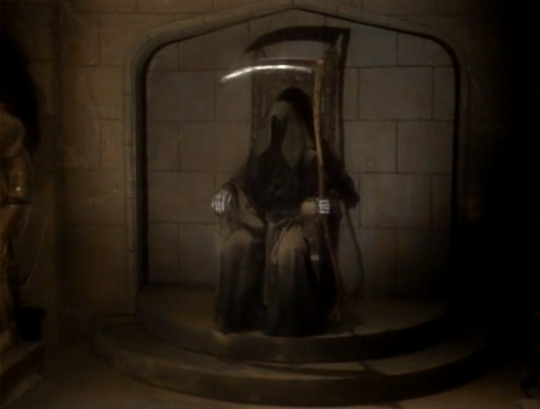

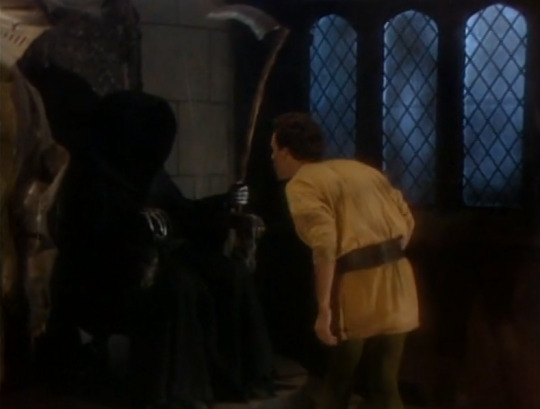
#faerie tale theatre#shelley duvall's faerie tale theatre#fearnot#fearless#the story of the youth who went forth to learn what fear was#the story of a boy who went forth to learn fear#the boy who left home to find out about the shivers
7 notes
·
View notes
Text
4. The Story of the Youth Who Went Forth to Learn What Fear Was
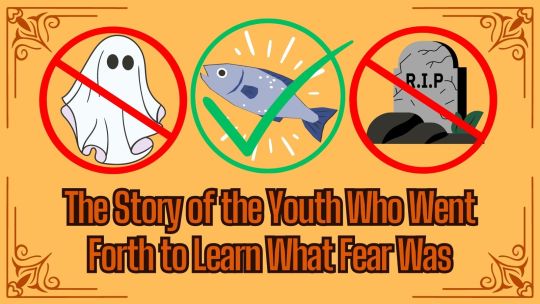
This week I am reading and reacting to the 4th story of the Brothers Grimm fairy tales about a young man who is trying to learn to shudder.
We will see many ways how NOT to scare someone, some fun and games in a haunted castle, and a courteous young man just trying to make sure everyone is warm.
~~~
A man has two sons. The elder (of course) was super smart and sensible and could do everything while the younger (of course) was stupid and could never learn or understand anything and everyone (rudely) said he would cause his father trouble (Ha, joke is on all of them. Little do they know youngest sons are always the protagonists of fairy tales and usually end up acquiring copious amounts of wealth and power BECAUSE they do not conform to society’s definitions of what is properly “smart”). The elder son was always “forced” (by who?) to do everything but he always flat out refused refused to fetch anything late at night or if it involved going to or by scary places, like churchyards and abandoned buildings since they made him shudder. They younger son was always confused by his brother going on about shuddering because such things never made him shudder...
Continue reading on my website blog here.
0 notes
Note
the 7-questions-ask: Mickey Mouse
Three facts about them from my personal headcanons:
*No matter how old he gets, he'll always go trick-or-treating on Halloween, and always write a letter to Santa before Christmas.
*His performance as Bob Cratchit in Mickey's Christmas Carol inspired Kermit the Frog to play the same role in The Muppet Christmas Carol. Otherwise, as the leader of the Muppets, Kermit would have felt obligated to play Scrooge, even though he wasn't really suited to the part; but Mickey made him realize he could play Bob, and he gave a speech thanking Mickey for the inspiration at the party following the movie's premiere.
*Every now and then, he stops by Forest Lawn Memorial Park in Glendale to visit not only Walt Disney's grave, but the graves of his second and third voice actors, Jimmy MacDonald and Wayne Allwine (and of Wayne's wife Russi Taylor, longtime voice of Minnie). He makes special arrangements to visit after-hours, so he won't be hounded by fans and so his presence won't detract from the serene, solemn atmosphere for other visitors.
A reason they suck:
His treatment of the farm animals in Steamboat Willie, especially when he shakes and kicks the nursing piglets from their mother and then pokes the mother pig's teats to make her "sing."
A reason they are great:
His friendliness and warmth in general.
A reason I relate to them:
I also love entertainment and fun.
(what I consider to be) the top tier otp/ot3 for that character:
Mickey and Minnie forever!
Five things that never happened to the character that I believe should have happened:
An official origin cartoon revealing how he met Minnie, Donald, and Goofy, and how he adopted Pluto.
An onscreen appearance by his sister Felicity Fieldmouse, the mother of his nephews Morty and Ferdie, who so far has only appeared in comics.
A cartoon adaptation of The Story of the Youth Who Went Forth to Learn What Fear Was – a spookier spiritual successor to his version of The Brave Little Tailor.
An animated cartoon based on the 1990 drawing that shows him consoling Kermit the Frog after Jim Henson's death. I can imagine him telling Kermit all about how he coped with the loss of Walt Disney back in 1966.
A cartoon supposedly showing the making of Steamboat Willie, depicting all the cartoon characters as actors, and making it clear that the farm animals Mickey and Minnie mistreat in that classic short were just fellow actors and not really hurt.
Five people that character never fell in love with and why.
Daisy Duck. She's too hot-tempered and too feathery for his taste.
Clarabelle Cow. She's too tall for his taste.
Clara Cluck. Again, he's not into birds.
Snow White. He would probably see her as more of a sister figure, and besides, she's human.
Jessica Rabbit. She's married, she's humanoid, and in terms of aesthetics, he prefers "cute" to "sexy."
12 notes
·
View notes
Note
Marine and Whimsical
Whimsical: Favorite fairytale?
OOOOOOO THERES SO MANY FOR ME TO PICK SO HARD TO DECIDE!!!!!!!!
Time for a top five list!
Town Musicians of Bremen
Hans my Hedgehog
Rumpelstiltskin
Fearnot/The Story of the Youth Who Went Forth to Learn What Fear Was
The Emperor's New Clothes
Marine: Favorite sea animal?
Time for another top five list since I have LOADS of favorites in this area!
Crabs (especially Japanese Spider Crabs, Yeti Crabs, and Horseshoe Crabs)
Sea Otters
Manatees/Sea Cows
Squids/Cuttlefish/Octopuses
Sea Slugs
------------------------------------------------------
I hope that you have fun reading through this my friend, it was a lot of fun to type up answers for!
I really do hope to see you here again and I hope you have an amazing day!!
1 note
·
View note
Note
the cast as fairytale characters or creatures, pretty pls? 🤩
Much credit to Ever for coming up with all of these!
- god killer: typhon (greek) | the younger son from the story of the youth who went forth to learn what fear was
- saint guillotine: chimera (greek) | death from death's messengers
- cursed soldier: cŵn annwn (welsh) | jack from jack the giant-killer
- king of drought: nalusa falaya (choctaw) | the shadow from the shadow
- master of death: nuckelavee (scottish) | the evil one from the stone of the wise men
- crooked hound: dybbuk (jewish) | the prince from the wicked prince
- razor fist: jersey devil (american) | the prince from the swineherd
- demon eater: draugr (scandinavian) | the soldier from the tinderbox
- flower of ice: la cegua (nicaraguan) | the princess from the travelling companion
- queen of plague: jorōgumo (japanese) | the demon from the painted skin
- madame massacre: pontianak (malaysian / indonesian) | helga from the marsh king's daughter
- bells of hell: fossegrimen (norweigian) | the cat from the cat and mouse in partnership
- little miss red: penanggalan (malaysian) | little red riding hood from little red riding hood
- sunken witch: grootslang (south african) | ursula from the little mermaid
- child of flames: ördög (hungarian) | peter pan from peter pan
- blood thief: ciguapa (dominican republic) | the princess from the three snake-leaves
- moon blade: bubak (czech) | the witch from the son of seven queens
- angel of terror: bū daryā (qatari) | the bridegroom from the robber bridegroom
0 notes